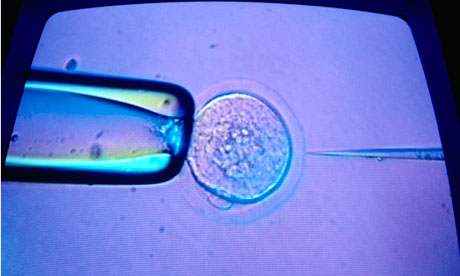
British doctors are developing a test for embryos that could dramatically raise success rates for couples who have IVF treatment.
The procedure checks embryos created at fertility clinics for biological signs that they are growing healthily and screens them for abnormal chromosomes.
By selecting only the best embryos to implant, researchers at Oxford University hope to improve pregnancy rates from the typical level of around 30% to nearer 100%.
Dagan Wells and his team already have a test that reveals abnormal chromosomes – one of the leading causes of IVF failure – in five-day-old embryos or "blastocysts". Embryos with major genetic faults can be rejected by the body in a miscarriage.
The more advanced form of the test checks early-stage embryos to ensure they have healthy mitochondria, the powerhouses inside cells, and normal telomeres, which cap the ends of chromosomes and prevent them from deteriorating during copying.
The procedure can be used on eggs as well as embryos and is expected to cost £2,000 on top of the standard costs of fertility treatment. The team hope to begin trials in Oxford later this year and make the test widely available to clinics in the second half of 2012.
Wells, whose work is due to be presented at the American Society for Reproductive Medicine meeting in Orlando on Tuesday, said: "The vast majority of embryos transferred worldwide have no genetic screening and 85% of these fail to establish a pregnancy."
"If you transfer to the uterus embryos that are confirmed to be chromosomally normal and develop well, reaching the blastocyst stage, the chance of producing a child is very high, about 70%. But that still leaves 30% that don't make it."
Embryos with shorter telomeres and abnormal numbers of mitochondria may also be less likely to result in a successful pregnancy.
"The new test looks at additional aspects of the embryo's biology, which may affect its ability to develop," Wells told the Guardian. "We hope this will allow us to accurately identify the embryo with the best chance of producing a healthy child, pushing the pregnancy rate beyond 80%."
Tony Rutherford, chair of the British Fertility Society, said the "exciting" technique took molecular screening of embryos "to a new level".
"Selecting the right embryo for replacement in a cost-effective, reproducible manner potentially has enormous benefits for patients, clinics and the health service overall," he said.
"Of course, as with any new technology, appropriate clinical studies are required to ensure that the benefits are realised. The difficulty we face is making sure adequate funding is made available to allow this new technique to be assessed fully before it enters clinical practice."

